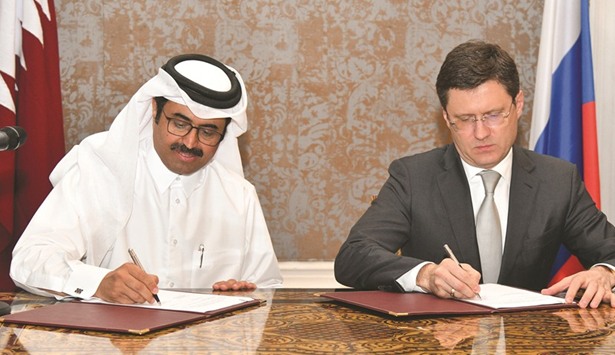Qatar’s energy minister has underscored the importance of forging stronger trade ties and enhancing economic cooperation between Qatar and Russia’s private sector to boost investment opportunities from both sides.
Speaking yesterday on the sidelines of the third meeting of the Joint Qatar-Russian Commission on Trade, Economic and Technical Cooperation, HE the Minister of Energy and Industry Dr Mohamed bin Saleh al-Sada highlighted cooperation opportunities between Qatar and Russia.
Also, al-Sada and Russian Energy Minister Alexander Novak yesterday signed a protocol for the joint commission’s third meeting, which discussed several topics of interest to Qatar and Russia, and joint relations in the energy, industry, culture, agriculture, and transport sectors.
The minister said both sides also agreed to work towards the conclusion of a tax agreement, and “to take steps in the cultural, industrial, and energy fields.” He noted that both the countries welcomed joint investments, especially those from Qatar Investment Authority.
On trade volume, al-Sada said while Qatar-Russia trade exchange increased by 92%, it “does not live up to the aspiration of the two sides.”
“Therefore, the governments of both countries encouraged the private sectors’ participation to increase joint trade,” he said.
This was reiterated by Qatar Chamber vice-chairman Mohamed bin Towar al-Kuwari, who, in a separate meeting at the Qatar Chamber headquarters, discussed investment opportunities with Russian-Arab Business Council director Tatiana Gvilava, who was part of Novak’s delegation.
Al-Kuwari also stressed on the need to increase trade volume between the two countries, which “now stands at around $500mn.”
Data provided by Qatar Chamber showed that total Qatari imports to Russia in 2015 stood at $100.7mn comprising food products, wheat and black wheat flour, electrical machinery and equipment, tools, articles of steel and iron, imitation jewellery, mineral fuels and mineral oils, copper wires, and tubes, pipes, and hollow profiles.
The total Qatari exports to Russia, on the other hand, stood at $10.6 comprising of organic chemical products, articles of iron and steel, glass fibre and its articles, and polymers of ethylene in its primary forms.
Speaking to Gulf Times on the sidelines of the meeting, Gvilava pointed out that both governments have completed the requirements for the signing of seven import food certificates from Russia.
“We are very serious to do business with Qatar and to attract Qatari investments to Russia,” said Gvilava.
Prior to the joint commission meeting, al-Sada and Novak discussed the situation of the global oil markets and ways to boost cooperation between Opec and non-Opec oil producers to restore stability to the market.
They also expressed their satisfaction with the level of compliance with the Vienna Agreements reached in December last year between Opec and non-Opec oil producers to cut Opec production by 1.2mn bpd and non-Opec by 588mn bpd as of January. The agreement is valid for six months, extendable for an equal period.
The fourth meeting of the Joint Qatar-Russian Commission on Trade, Economic and Technical Cooperation will be held in Russia in 2018, al-Sada said. He also welcomed Novak’s invitation to attend the industrial exhibition in Russia in July.

HE the Minister of Energy and Industry Dr Mohamed bin Saleh al-Sada and Russian Energy Minister Alexander Novak signing an agreement during the third meeting of the Joint Qatar-Russian Commission on Trade, Economic and Technical Cooperation held yesterday. PICTURE: Noushad Thekkayil

